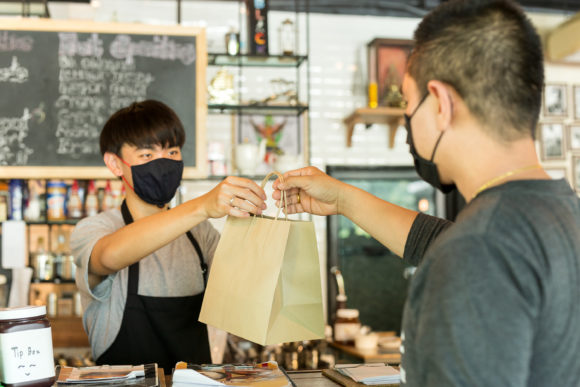An insurer fighting business income claims from restaurants is arguing in part that there is no coverage because businesses were allowed to provide takeout and delivery service during lockdowns.
Society Insurance, based in Fond du Lac, Wisconsin, has filed a motion in federal district court to dismiss a class action lawsuit against it over the denial of business loss of income claims tied to the coronavirus epidemic.
In the brief filed with the U.S. District Court, Eastern District of Wisconsin, Society said the class action brought against it by restaurants and bars in Wisconsin, Minnesota and Tennessee is without merit because Society’s businessowners policies do not cover the claims for damages for which the plaintiffs have filed.
The lawsuit, led by plaintiffs Madison Sourdough and Willy McCoys, seeks “coverage for loss of business income and extra expense resulting from the suspension or reduction of their operations after the Governors of Wisconsin, Minnesota and Tennessee issued orders related to the COVID-19 pandemic.”
However, Society maintained, beyond the fact that the businesses’ properties have not been physically damaged or destroyed, the plaintiffs were not barred access to their properties and were not prohibited from providing food and beverages. In fact, they “were allowed and encouraged to continue takeout and delivery service,” Society said in its brief. “Under these circumstances, the Society policy does not provide coverage.”
Society specializes in insuring bars, taverns, hospitality, restaurants, entertainment venues and other specialty niches.
The class action is similar to other lawsuits brought against insurers by businesses across the nation that were forced to close their regular operations by governments in various states with the aim of controlling the spread of COVID-19.
While restaurants and bars in the three states in which the plaintiffs operate were required to “stop providing food and beverages for on-premises consumption,” they have been permitted to operate take out and delivery service.
The plaintiffs allege they nevertheless have lost income as a result of the required closures.
The plaintiffs each had purchased businessowners policies, “which included Business Income, Civil Authority, Contamination, Extra Expense and Sue and Labor Coverages,” Society stated.
Society’s main argument against the claims for coverage brought by the plaintiffs is that they have not been able to show they suffered direct physical loss of or damage to properties covered under their policies.
A major obstacle for restaurants and taverns that have filed similar lawsuits against insurers seeking compensation under their businessowners policies after being required to close their doors to the public as a result of the COVID-19 pandemic, is that the majority of businessowners policies, like Society’s, do not cover business income losses unless the insured premises are physically damaged by an event precipitating the claim.
In its brief, Society compares the temporary operational limits placed on businesses by the governors’ executive orders “to a change in zoning resulting in different hours a business can be open or a temporary suspension of a liquor license.”
This “partial limitation of business operations is an intangible financial situation, not an alteration in the physical characteristics of the property,” Society noted.
Related:
Was this article valuable?
Here are more articles you may enjoy.


 LA County Told to Pause $4B in Abuse Payouts as DA Probes Fraud Claims
LA County Told to Pause $4B in Abuse Payouts as DA Probes Fraud Claims  Credit Suisse Nazi Probe Reveals Fresh SS Ties, Senator Says
Credit Suisse Nazi Probe Reveals Fresh SS Ties, Senator Says  Tesla Sued Over Crash That Trapped, Killed Massachusetts Driver
Tesla Sued Over Crash That Trapped, Killed Massachusetts Driver  Cape Cod Faces Highest Snow Risk as New Coastal Storm Forms
Cape Cod Faces Highest Snow Risk as New Coastal Storm Forms 